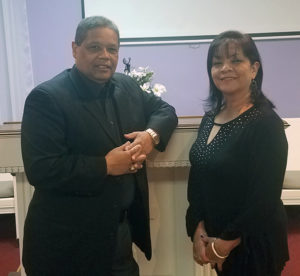Hispanic ministry demands multicultural awareness
Terms like “Hispanic” or “Latino” may suggest a group of people who share a common language and culture, but leaders of Hispanic Texas Baptist churches know better.
The Pew Research Center reported in 2012 only about one-fourth of adult Hispanics identify themselves as “Hispanic” or “Latino,” preferring instead to identify by their family’s nation of origin—Mexico, Cuba, Honduras, El Salvador or elsewhere. Only 29 percent said all Hispanics in the United States shared a common culture.
Of the total U.S. Hispanic population, Pew researchers reported people of Mexican family origin accounted for 63 percent in 2015—a clear majority, but down from the high of 66 percent in 2008.
Let individuals tell their own stories
Many pastors of Hispanic congregations in Texas increasingly recognize the need for multicultural awareness.

“As Christians, we must go through cultural barriers in order to connect with people,” said Oscar Camacho, pastor of Iglesia Hispana Antioch in Farmers Branch.
Camacho and his wife, Margoth, are from Colombia. Their church includes families from Mexico, Honduras, Puerto Rico, El Salvador, Colombia and other Latin American countries.
“Our stories as Hispanics can be very similar, but there are not two people who are the same in this world,” Camacho said. “We must hear individuals tell their own story.”
Cultural differences can be an issue, but Iglesia Hispana Antioch seeks to help believers recognize their primary identity in Christ, Camacho said.
“That is why we call ourselves an embassy of worship and praise,” he explained. “We want to establish our identity as (a group of people) that worships and praises God.”

To help the congregation pursue that identity, Camacho said, he understands he must let go of his own culture in some regards to improve communication with people from other cultures. As communication improves, relationships grow, he said.
“As a pastor, I can be a mentor and help people develop their faith when I have a close relationship with them,” he said.
But learning to communicate with individuals and with the congregation as a whole is a continuous process, Camacho acknowledged.
“We grew up in a church where we had constant interaction with the pastor, and we were able to develop our leadership skills,” he said. “That is what we aim to do here, too.”
Reaching people from different cultures
Past experiences confirm how God prepares people to serve where they are now, said Kevin Harris, pastor of First Baptist Church in Los Fresnos.

Although Harris is not Hispanic, his wife Olga is from Venezuela. They met in seminary, and since then, he has grown to understand more what it means to serve people from other cultures, he said. He has been involved in Hispanic churches and learned Spanish throughout the years.
Harris noted he and his wife have talked extensively about the differences between Hispanics from different places and how a church can offer a multicultural ministry that reaches people of varied backgrounds.
While Harris initially served in lay ministry, God prepared him to become pastor of First Baptist in Los Fresnos, he believes.
His experiences with Hispanic congregations in the Dallas-Fort Worth area were different than those in Los Fresnos, a city close to the border with Mexico, he noted.
“As a pastor, I know that means I need to take the time to learn the culture of the congregation,” Harris said. “I must move slowly, take the time to talk to people and understand the way they do things.”
Develop a missional mindset
He also pointed to a book he found helpful, A Future for the Latino Church: Models for Multilingual, Multigenerational Hispanic Congregations by Daniel Rodriguez.
Like the community it serves, First Baptist in Los Fresnos includes both Hispanic families with ties to Mexico and Anglo families.
Due to the town’s proximity to the border, the majority of Hispanic families in Los Fresnos are from Mexico.
In a cross-cultural congregation, members must make a conscious effort to try to understand each other, Harris emphasized.
“Language and culture can be a natural divide unless the leadership of the church is intentional in breaching that divide and bringing healing,” he said. “That’s why we must bring a cross-cultural mindset—a missional mindset.”
He learns from and works alongside his wife, who has a background in marriage and family counseling and has worked with Mexican populations more than 20 years.
Both Harris and Camacho noted the type of Spanish spoken by people from different areas varies widely. Words can carry different meanings, depending on locale.
However, a willingness to learn and to keep an open mind allows people of varied educational backgrounds and cultures to communicate with each other, Harris said.
“We know we must be fully fluid in a multilingual and multigenerational church,” Harris noted. “We must balance well the mix of the cultures.”
Through contextual communication, a pastor can speak effectively of the calling God has given to the church, Harris said.
“It is then we can help the church turn toward the outside,” rather than focusing internally, he said.
Read more articles like this in CommonCall magazine. CommonCall explores issues important to Christians and features inspiring stories about disciples of Jesus living out their faith. An annual subscription is only $24 and comes with two free subscriptions to the Baptist Standard. To subscribe to CommonCall, click here.